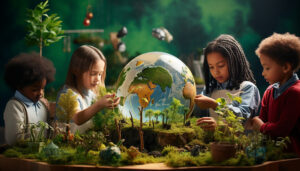At the heart of our educational philosophy is the belief that learning should be an enjoyable and engaging experience. Our approach centers around the concept of “Learning Through Play,” which is grounded in the understanding that play is a fundamental way through which young children learn and develop. By integrating play into our curriculum, we create a vibrant and dynamic learning environment that supports cognitive, social, and emotional growth. Here’s a closer look at our approach and how it benefits our students.
The Power of Play in Learning
Play is more than just a fun activity for children; it is a powerful educational tool. Through play, children explore their environment, experiment with ideas, and develop essential skills. Our approach harnesses the power of play to facilitate learning across various domains, including language, math, science, and social skills. By allowing children to learn through play, we tap into their natural curiosity and creativity, making learning an enjoyable and meaningful experience.
Play-Based Learning Framework
Our play-based learning framework is designed to foster a rich and stimulating environment where children can thrive. We incorporate a variety of play types, including structured play, free play, and guided play, each serving a unique purpose in the learning process:
- Structured Play: This type of play involves organized activities with specific goals, such as building blocks or puzzle-solving. Structured play helps children develop problem-solving skills, critical thinking, and hand-eye coordination. Our educators guide these activities to ensure that they align with learning objectives and provide opportunities for skill development.
- Free Play: Free play allows children to explore and create on their own terms. It encourages imagination and creativity, as children choose their own activities and follow their interests. Free play promotes independence, decision-making, and social interaction. We provide a variety of materials and resources to support free play, from art supplies to outdoor equipment.
- Guided Play: In guided play, teachers offer purposeful activities that are designed to enhance specific learning outcomes. For example, a teacher might introduce a game that reinforces early literacy skills or use role-playing scenarios to teach social concepts. Guided play balances child-led exploration with teacher support, ensuring that learning objectives are met while still allowing for creativity and self-expression.
Supporting Cognitive Development
Play is a natural way for children to develop cognitive skills. Through play, they engage in activities that promote problem-solving, critical thinking, and understanding of concepts. For instance, playing with building blocks helps children grasp basic mathematical concepts like shapes and measurements. Similarly, role-playing games encourage children to use language skills and expand their vocabulary. Our curriculum is designed to incorporate these opportunities for cognitive growth within the context of playful and enjoyable activities.
Enhancing Social and Emotional Skills
In addition to cognitive development, play is crucial for social and emotional growth. When children play together, they learn important social skills such as sharing, cooperation, and conflict resolution. They also develop emotional intelligence by navigating interactions and expressing their feelings. Our play-based approach includes group activities and collaborative projects that help children build strong social bonds and develop empathy and self-regulation.
Encouraging Creativity and Imagination
Creativity and imagination are central to our play-based learning approach. By providing a variety of open-ended materials and opportunities for creative expression, we encourage children to explore their imagination and think outside the box. Activities such as art projects, dramatic play, and storytelling allow children to express themselves, experiment with new ideas, and develop a sense of wonder. This creative exploration supports not only cognitive development but also emotional well-being and self-confidence.
Assessment and Reflection Through Play
Our approach to learning through play also includes ongoing assessment and reflection. Teachers observe and document children’s play to gain insights into their developmental progress and interests. This information helps us tailor our curriculum to meet individual needs and ensure that each child is challenged and supported appropriately. Reflection on play experiences also allows children to make connections between their activities and learning outcomes, reinforcing their understanding and engagement.
Fostering a Lifelong Love of Learning
Ultimately, our goal is to foster a lifelong love of learning by making education a joyful and meaningful experience. By integrating play into our curriculum, we create an environment where children are excited to explore, discover, and learn. This positive experience sets the stage for future academic success and a continued enthusiasm for learning.
In summary, our approach to learning through play is centered around creating a dynamic and supportive environment where children can thrive. By harnessing the power of play, we support cognitive, social, and emotional development while fostering creativity and imagination. Our play-based learning framework ensures that education is engaging, effective, and enjoyable, laying the foundation for a lifelong love of learning.




